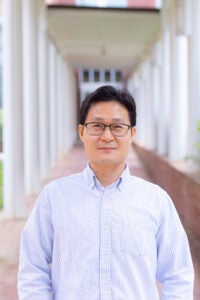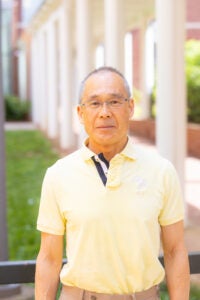MIC Research Scientists
MIC Research Scientists
 Godfrey A. Dzhivhuho, PhD
Godfrey A. Dzhivhuho, PhD
Research Scientist
Rekosh and Hammarskjöld Laboratory
Microbiology, Immunology & Cancer Biology Department
University of Virginia
Email: gad3u@virginia.edu | godfreydzhivhuho@gmail.com
Publications: Google Scholar
LinkedIn
Godfrey Dzhivhuho is a virologist whose work centers on understanding how HIV-1 manipulates host and viral pathways to regulate the export of intron-containing RNA, an essential step in viral replication and a key barrier to latency reversal. His research integrates CRISPR-based functional genomics, RNA biology, and viral mutational analysis to uncover mechanisms of HIV persistence and reactivation.
He earned his PhD in Medical Virology from the University of Cape Town, where he demonstrated that chronic Schistosoma mansoni infection suppresses immune responses to candidate HIV vaccines and exacerbates vaccine-associated pathology. This early work sparked his lasting interest in how immune context shapes viral pathogenesis and vaccine efficacy.
In 2017, Dzhivhuho joined the Rekosh and Hammarskjöld lab at the Myles H. Thaler Center for AIDS and Human Retrovirus Research at the University of Virginia. There, he leads investigations into the HIV-1 Rev–Rev Response Element (RRE) axis, revealing how small changes in Rev sequence profoundly alter RNA export efficiency, viral fitness, and the likelihood of latency reversal. These findings point to the Rev-RRE system as a potential therapeutic target in HIV cure strategies. Recent studies from his group show that viruses with low Rev activity replicate more slowly and resist reactivation, while higher Rev activity promotes both replication and latency reversal, offering insight into how viral reservoirs persist despite therapy.
In addition to his HIV work, Dzhivhuho contributes to SARS-CoV-2 research, including efforts to dissect spike protein-mediated viral entry and the role of TMPRSS2. He is also co-author of a widely cited review on the environmental factors influencing COVID-19 seasonality across global regions.
A recipient of the Leonard ‘Pug’ Evans Retrovirology Prize (2022), he actively mentors graduate and undergraduate researchers and has co-authored multiple high-impact publications. His work has appeared in PLOS Pathogens, Scientific Reports, Current HIV Research, and the International Journal of Environmental Research and Public Health.
 Ian J. Glomski, PhD
Ian J. Glomski, PhD
Senior Research Scientist
Department of Microbiology, Immunology & Cancer (MIC)
University of Virginia
Email: iglomsk@virginia.edu
Ian’s research experience has touched on a broad range of disciplines related to the pathogenesis of bacteria, including Bacillus anthracis at the Institute Pasteur, Listeria monocytogenes at the University of California, Berkeley, and now Neisseria gonorrhoeae in the Criss Lab at the University of Virginia. His primary research focuses on the establishment and utilization of a cervicovaginal biomimetic model of gonorrhea to explore the interplay of N. gonorrhoeae, the innate immune system, and the microbiome in health and disease.

 Shekhar Saha, PhD
Shekhar Saha, PhD
Senior Research Scientist
Department of Microbiology, Immunology & Cancer (MIC)
University of Virginia
Email: ss7st@virginia.edu
Google Scholar Profile
LinkedIn Profile
Dr. Shekhar Saha is a senior research scientist at the School of Medicine at the University of Virginia. He earned his PhD from the Indian Association for the Cultivation of Science, India, where his research focused on understanding the role of Nonmuscle Myosin II-C2 in neuritogenesis. He demonstrated that Nonmuscle Myosin II-C2 interacts with β-integrin to regulate neurite adhesion to the substratum, ultimately influencing neurite growth.
Following his PhD, Shekhar joined the University of Virginia for postdoctoral training, where he investigated the role of long noncoding RNAs in cancer, with a particular emphasis on prostate cancer and glioblastoma. Currently, his research centers on using CRISPR/Cas9 screening to study glioblastoma in combination with various drugs. He aims to identify novel therapeutic strategies to effectively inhibit glioblastoma initiation and progression.
 Mirna Perusina-Lanfranca, PhD
Mirna Perusina-Lanfranca, PhD
ORCID: 0000-0002-3845-2585
Linkedin: linkedin.com/in/mirna-p-638799176
Dr. Mirna Perusina-Lanfranca is a tumor immunologist with extensive and diverse research experience. Passionate about translational science. Dedicated mentor and teacher. She is currently a research scientist in Dr. Victor Engelhard’s lab at the Carter Immunology Center at the University of Virginia, studying the regulation of T cell homing to tumors. In several tumor types, an immune-supportive tumor microenvironment in addition to the presence of CD8 T cells is associated with better clinical outcomes for patients. The factors that regulate the entry of CD8 T cells into tumors are not completely understood. A major research area of Dr. Perusina-Lanfranca is understanding the mechanisms that control the entry of CD8 T cells, focusing on the role of the vasculature, tumor endothelial cells crosstalk with the immune infiltrate and its impact on tumor immunity, as well as their role mediating metastatic disease.

Takashi Shimoike, PhD
Research Scientist
Department of Microbiology, Immunology and Cancer research
University of Virginia
E-mail: shimoike@virginia.edu
My name is Takashi Shimoike. I major in virology and molecular virology. I am interested in viruses, especially, RNA viruses. I came to the US in 2021 and joined the Ham and Rek lab in November 2022 and started to investigate the function of the nucleocapsid (N) protein of SARS CoV-2 especially the function in nucleus and see the interaction of N protein with host genes and proteins.
Before I came to the USA, I worked at National Institute of Infectious Diseases in Japan for 25 years. During stay in Japan, I investigated Hepatitis Virus C, especially the translational initiation caused by its IRES. I found the translational repression by the nucleocapsid (core) protein. I also found that Protein Kinase R (PKR) was autophosphorylated by the IRES RNA that is highly structured and highly conserved. This causes the repression of the host protein synthesis through the phosphorylation pathway (PKR–>eIF2α), but the translation of HCV is not repressed. I also investigate Norovirus. I found that the norovirus RNA dependent RNA polymerase binds to the stem loop of the negative sense 3’end (corresponding to the positive strand 5’end) of the genome RNA, and then the positive strand genome RNA was synthesized.
I hope that these experiences would help you.
I need to find a new lab this November. I hope my scientific journey continues.
I like swimming, biking and jogging.
 Xian Zhou, PhD
Xian Zhou, PhD
Research scientist
Department of Microbiology, Immunology & Cancer (MIC)
University of Virginia
Email: krt9kk@virginia.edu
Xian completed her graduate studies at Fudan University in Shanghai, where she gained valuable experience in both human and mouse vaccine development, adjuvant screening, and evaluation of immune responses post vaccination. In 2017, she joined the Mayo Clinic as a postdoctoral fellow, focusing on metabolic regulation of immune cell development and function, as well as immune metabolism in autoimmune diseases.
Driven by a strong interest in cancer immunology, she later joined Dr. Hui Zong’s laboratory at the University of Virginia (UVA) to investigate immune surveillance against pre-cancerous cells during the premalignant stage of breast cancer. The Zong lab has developed a triple-negative breast cancer (TNBC) mouse model using stochastic Brca1–Trp53 knockout with Mosaic Analysis with Double Markers (MADM) (Zong et al., Cell, 2005; Zeng et al., Dis. Model. Mech., 2023) in active mammary progenitors. Using multiple spatial profiling tools, she discovered that immune surveillance—particularly T and B cell–driven immune aggregate formation—plays a critical role in restraining premalignant progression long before tumor formation.
